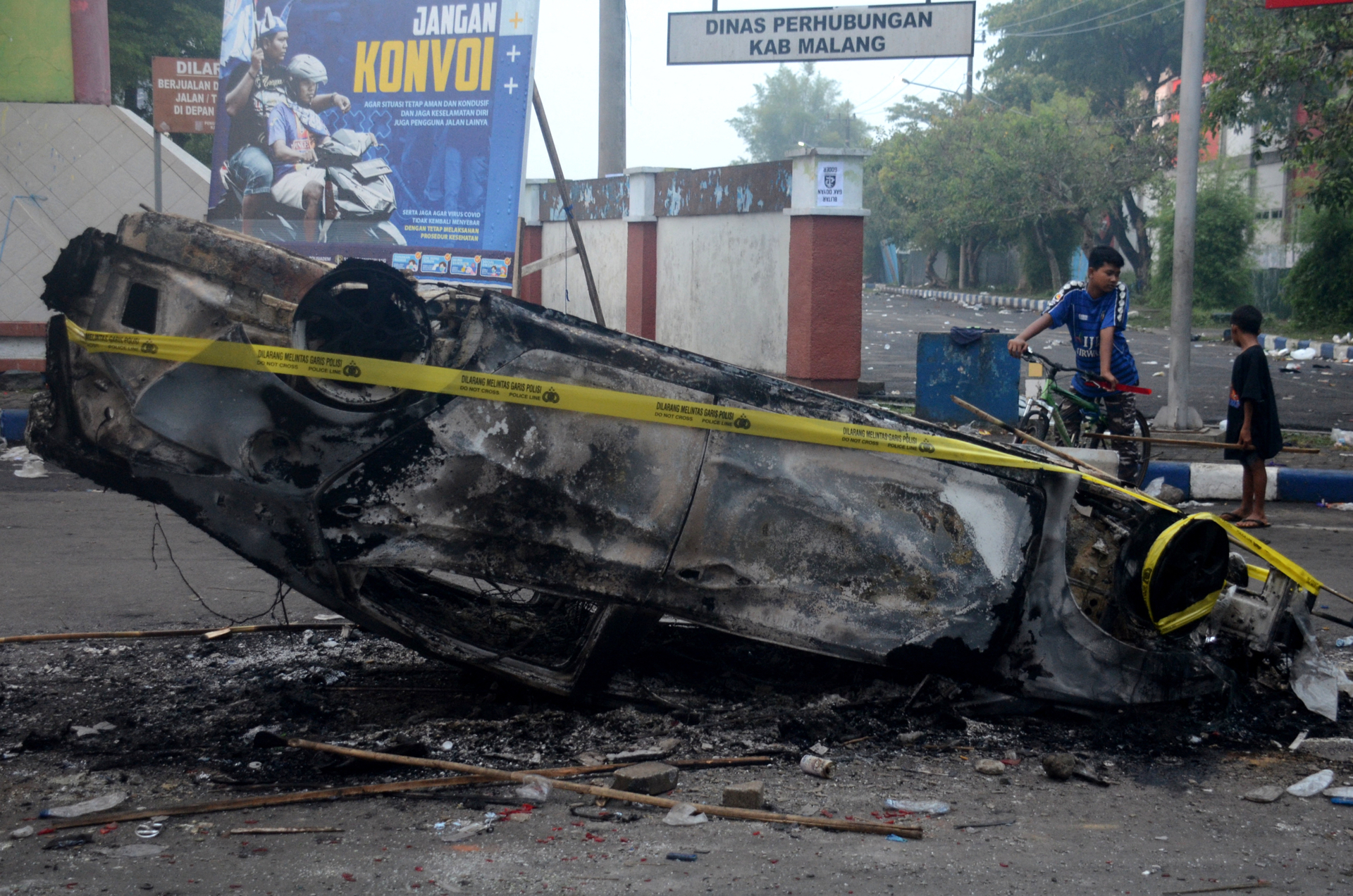Hundreds killed, hurt in stampede at Indonesia football match
Police fire tear gas after fans invade pitch in East Java, triggering a stampede that killed at least 125 people and injured 100 more.
At least 125 people have been killed and dozens more injured in a riot and a stampede at an Indonesian football stadium.
The tragedy on Saturday night in the eastern city of Malang was one of the world’s deadliest sporting stadium disasters.
Police in East Java province said thousands of fans of Arema FC stormed the pitch at Kanjuruhan Stadium after their team lost 3-2 to Persebaya Surabaya. Officers tried to control the “riots” by firing tear gas, triggering a stampede as panicked fans rushed to an exit gate.
Some suffocated in the chaos while others were trampled to death. At least 34 people, including two police officers, died at the stadium.
The death toll was revised down to 125, according to East Java Vice Governor Emil Dardak, who said that some names were recorded twice. Earlier officials had put the figure as high as 174.
A hospital director told local television that one of the victims was five years old.
Video footage from local news channels showed fans streaming onto the pitch in the Kanjurujan Stadium in Malang after Arema FC lost to Persebaya Surabaya. Scuffles can be seen, with what appeared to be tear gas in the air. Images also showed people who appeared to have lost consciousness being carried away by other fans.
The stadium holds 42,000 people and authorities said it was a sell-out. Police said about 3,000 people had stormed the pitch. Vehicles outside the stadium were also torched, including at least five police cars and trucks.
At least 125 people have been killed and dozens more injured in one of the world’s deadliest stadium disasters after a riot and stampede at an Indonesian football match ⤵️ 🔗: https://t.co/9DMF17kfiC pic.twitter.com/XVql2HztXY — Al Jazeera English (@AJEnglish) October 2, 2022
Survivors described panicking spectators in a packed crowd as tear gas rained down on them.
“Officers fired tear gas, and automatically people were rushing to come out, pushing each other and it caused many victims,” a 43-year-old spectator told the AFP news agency. “Nothing was happening, there was no riot. I don’t know what the issue was, they suddenly fired tear gas. That’s what shocked me, didn’t they think about kids, women?”
League suspended
President Joko Widodo ordered an investigation into the tragedy, a safety review into all football matches and directed the country’s football association to suspend all matches until “security improvements” were completed.
“I deeply regret this tragedy and I hope this football tragedy will be the last in our country,” Widodo said.
Meanwhile, FIFA President Gianni Infantino said the the football world was “in a state of shock”.
“All our thoughts and prayers are with the victims, those who have been injured, together with the people of the Republic of Indonesia,” he added.
Fan violence is an enduring problem in Indonesia, with a strong rivalry between clubs sometimes leading to violence among supporters. Arema FC and Persebaya Surabaya are longtime rivals and the latter’s fans were not allowed to buy tickets for Saturday’s game due to fears of violence.
Indonesia’s coordinating minister for political, legal and security affairs, Mahfud MD, said organisers had ignored authorities’ recommendation to hold the match in the afternoon instead of the evening. He also said the government had recommended only 38,000 tickets be printed, but there was instead a sell-out crowd of 42,000. “The government has made improvements to the implementation of football matches… and will continue to improve. But this sport, which is a favourite of the wider community, often provokes supporters to express emotions suddenly,” he said in an Instagram post.
World soccer’s governing body FIFA specifies in its safety regulations that no firearms or “crowd control gas” should be carried or used by stewards or police. East Java police did not immediately respond to a request for comment on whether they were aware of such regulations.
Referring to the FIFA rules, Amnesty International criticised the use of tear gas in the stadium and urged authorities to “conduct a swift, thorough, and independent investigation” and “ensure that those who are found to have committed violations are tried in open court and do not merely receive internal or administrative sanctions”.
“This loss of life cannot go unanswered,” said Usman Hamid, the executive director of Amnesty International Indonesia.
The Football Association of Indonesia (PSSI) said it would send its own investigation team to Malang to establish the cause of the crush. It also banned Arema FC from hosting home games for the rest of the season.
“We’re sorry and apologise to families of the victims and all parties over the incident,” PSSI Chairman Mochamad Iriawan said.
The tragedy comes as Indonesia is scheduled to host the FIFA U-20 World Cup in May and June next year. They are also one of three countries bidding to stage next year’s Asian Cup, the continent’s equivalent of the Euros, after China pulled out as host.
Al Jazeera’s Jessica Washington, reporting from the Indonesian capital, Jakarta, said Saturday’s disaster was “historic”.
“Violence and riots are a common occurrence at football matches in Indonesia, but we have never seen something like this before,” she said.
“This is a historic tragedy, not only for football in Indonesia but football internationally. This is one of the biggest tragedies the sport has seen, in terms of fan violence, in terms of deaths of fans at a match,” she added.
Other stadium disasters include a 1964 crush at a Peru-Argentina Olympic qualifier at Lima’s National Stadium that killed some 320 people, and the 2012 Port Said stadium tragedy in Egypt where 74 people died in clashes.
In 1989, some 96 Liverpool supporters were crushed to death in the United Kingdom, when an overcrowded and fenced-in enclosure collapsed at the Hillsborough Stadium in Sheffield.













